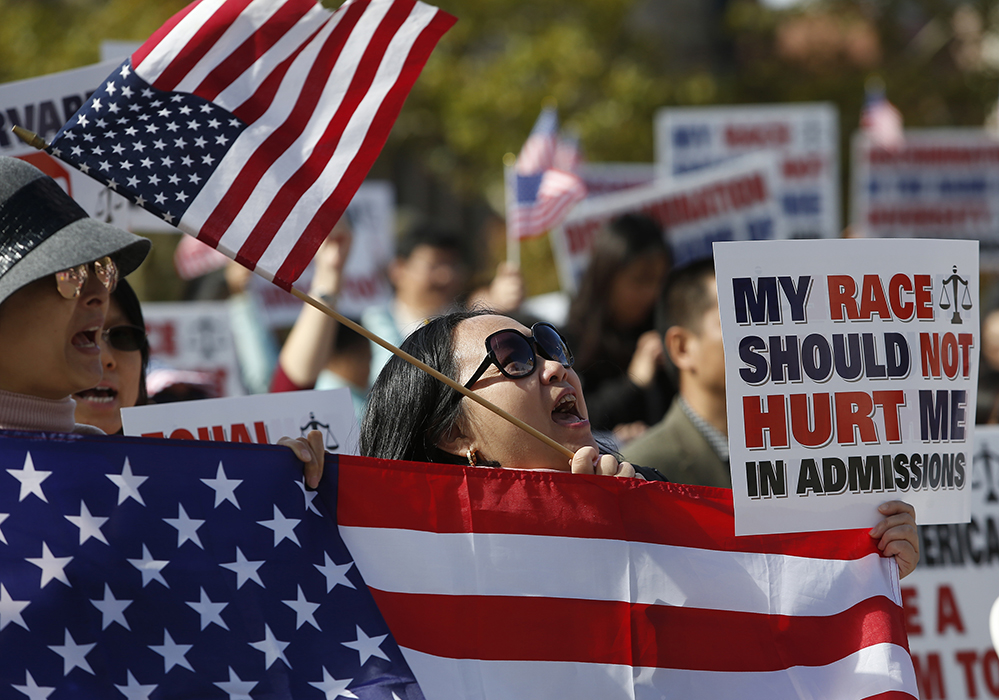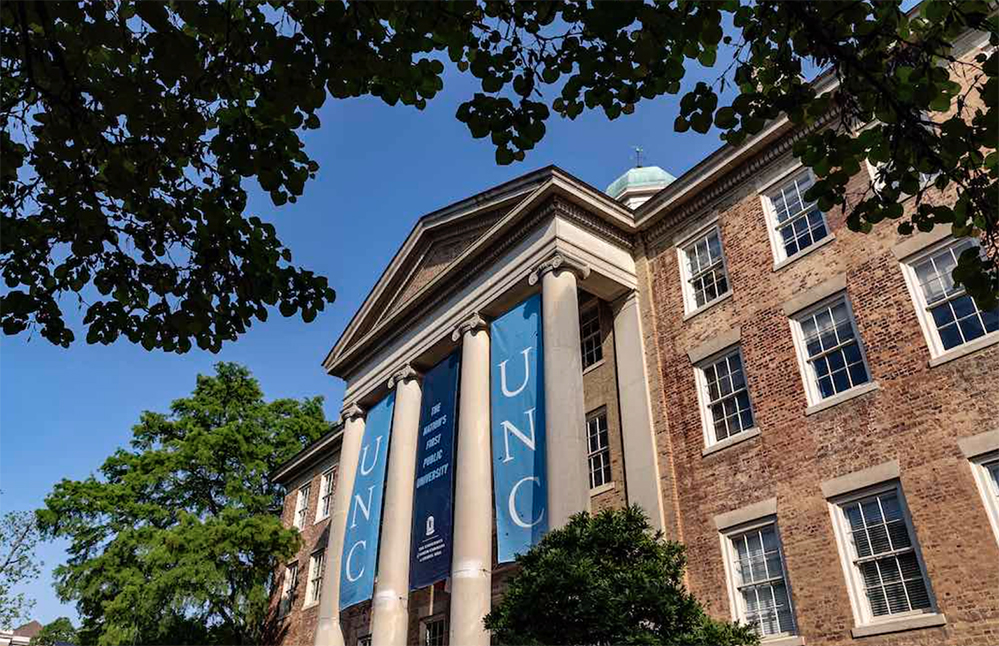No paywall. No pop-up adverts. Keep The 74 free for everyone with a generous donation.
The U.S. Supreme Court docket will hear oral arguments Monday in a pair of carefully watched circumstances that might decide whether or not universities can proceed to contemplate race in pupil admissions.
Whereas it’s targeted on increased schooling, the courtroom’s ruling in these circumstances is certain to filter all the way down to Ok-12 faculties.
“Regardless of one of the best efforts of faculty districts … to create extra numerous faculties, racial segregation has elevated during the last twenty years. Because of this, instructional inequities persist,” in keeping with a brief filed by the Council of the Nice Metropolis Faculties in protection of admissions insurance policies at Harvard College and the College North Carolina.
Not less than 18 million college students attend Ok-12 faculties the place greater than three-quarters of the enrollment is of a single race, a latest Government Accountability Office report confirmed, and 14% of scholars attend faculties the place a minimum of 9 out 10 of scholars are of the identical race.
College students for Honest Admissions, the plaintiffs within the case, are difficult admissions standards at these universities they declare discriminate towards Asian college students. Admissions, they are saying, must be primarily based on advantage.
They need the courtroom to overturn a 2003 opinion in Grutter v. Bollinger that upheld race-based admissions on the College of MIchigan Legislation College. In that ruling, former Justice Sandra Day O’Connor foresaw a nation during which “the usage of racial preferences will now not be needed.” The Biden administration, Democrats in Congress, and advocates for Black and Hispanic college students, argue that affirmative motion is much more important at the moment as a result of faculties are nonetheless segregated and the promise of integration beneath Brown v. Board of Training, “stays unfulfilled.”

Supporters of affirmative motion anticipate the courtroom’s six conservative justices to facet with the plaintiffs. Whereas this would be the first time Justice Ketanji Brown Jackson hears an schooling case, she’s certainly one of simply three liberal justices. And she or he’ll solely sit on the bench for the UNC arguments, having recused herself from the Harvard case as a result of she served on the varsity’s Board of Overseers till this previous June.
“I believe it’s extremely seemingly that the courtroom takes a place that disallows the usage of race in any way in increased schooling admissions,” stated Stefan Lallinger, a senior fellow at The Century Basis, a progressive assume tank. That, he stated, may put “a remaining nail within the coffin of efforts by faculties and universities across the nation to immediately make sure that all of their college students profit from a racially numerous pupil physique.”
Most specialists see two routes for the courtroom to soak up this case. First, the courtroom may comply with the precedent set for Ok-12 faculties in a 2007 case towards Seattle Public Faculties and the Jefferson County Public Faculties in Kentucky.
In Parents Involved in Community Schools v. Seattle School District, the courtroom dominated that college districts couldn’t explicitly use race of their efforts to create extra numerous faculties. However individually, Justice Anthony Kennedy wrote that districts nonetheless had a “compelling curiosity” to pursue racial integration. Since then, districts have moved towards voluntary integration programs primarily based on household earnings.
Noting the courtroom’s latest choice to overturn the constitutional proper to abortion, many predict that the six conservative justices gained’t be certain by precedent.
“It must be famous that the one motive the courtroom salvaged any use of race within the [Parents Involved] case was the moderation of Justice Anthony Kennedy,” Lallinger stated.
That’s why he thinks it’s potential the courtroom may take a second strategy and rule as unconstitutional all efforts to realize range.
“The present courtroom doesn’t have an Anthony Kennedy,” Lallinger stated.
‘Strain to discriminate’
Within the wake of the Dad and mom United opinion, many conservatives proceed to carry that among the admissions insurance policies Ok-12 faculties use for aggressive faculties are discriminatory.
Within the Fairfax County, Virginia, faculties, for instance, the libertarian Pacific Authorized Basis is representing plaintiffs who sued the district over adjustments to acceptance standards on the Thomas Jefferson Excessive College for Science and Expertise. The district dropped a rigorous admissions take a look at and a $100 utility price, and reserved seats for the highest 1.5% of eighth graders in every center faculty. Board members expressed hope that the adjustments would improve illustration of Black and Hispanic college students on the faculty, which the plaintiffs argued was unlawful “racial balancing.”
“We’re all entitled to every be judged on our personal particular person traits, not on the idea of our membership in a bunch,” stated Wen Fa, a senior legal professional on the regulation agency, which can also be difficult related admission insurance policies in New York Metropolis, Boston and Montgomery County, Maryland.
In its brief supporting College students for Honest Admissions, the nonprofit Dad and mom Defending Training wrote that the 2003 choice in Grutter v Bollinger has “spawned rising racial discrimination” that has unfold to the Ok-12 system.
“So long as Grutter stays the regulation, Ok-12 faculties will face an inexorable strain to discriminate primarily based on pores and skin coloration,” the temporary stated.
However even these difficult the college insurance policies level to integration efforts primarily based on household earnings because the path for increased schooling, stated Richard Kahlenberg, a researcher who wrote a book on the difficulty. He served as an skilled witness for the plaintiffs when the case was in a decrease courtroom, and he doesn’t assume the justices have hinted that they might rule out all efforts to realize range.
“Not a single Supreme Court docket justice has indicated that they entertain that excessive place,” he stated.
He pointed to Justice Clarence Thomas’s confirmation hearings in 1991, during which Thomas defended applications that give choice to college students who overcome obstacles.
“The youngsters may come from any background of drawback,” Thomas stated. “The child might be a white child from Appalachia, might be a Cajun from Louisiana, or might be a Black child or Hispanic child from the internal cities or from the barrios, however I defended that form of a program then and I might defend it at the moment.”
However the courtroom has grown much more conservative since Thomas joined. Most specialists don’t anticipate totally different outcomes from the 2 circumstances, however word that Jackson is prone to elevate questions within the UNC case that may not floor within the Harvard listening to.
There’s one clear distinction between the 2. Harvard is a personal college and due to this fact topic to Title VI of the Civil Rights Act, which applies to any establishment receiving federal funds. However UNC is a public college and is guided by the Structure, particularly the 14th Modification’s assure of equal safety.
Kahlenberg stated that by taking each circumstances, the courtroom can problem rulings primarily based on each legal guidelines.
Influence on recruiting
Training advocates in North Carolina are already assessing the potential influence if the courtroom ends affirmative motion. Black and Hispanic college students within the state could have fewer alternatives to attend the flagship college, in keeping with researchers on the Hunt Institute, an schooling assume tank.

Simply have a look at California, the place voters banned affirmative motion in 1996, wrote Madeline Smith, and Erica Vevurka, administrators of upper schooling and Ok-12, respectively, on the institute.
“The ban [on] affirmative motion made it harder for the state’s public establishments of upper schooling to explicitly recruit college students of coloration,” they wrote. “It additionally restricted the entry that college students of coloration needed to data round monetary support choices.”
After 1996, the enrollment of freshman from underrepresented minority teams dropped by a minimum of 50%, in keeping with a brief that the College of California submitted to the Supreme Court docket in help of Harvard and UNC.
Despite the fact that the state has applied range efforts concentrating on low-income households and first-generation faculty college students, the college system “struggles to enroll a pupil physique that’s sufficiently racially numerous to achieve the academic advantages of range,” the temporary says.
Past faculty admissions, some specialists say the case has implications for efforts to create a extra numerous instructor workforce, particularly within the wake of the pandemic.
A ruling for the plaintiffs may “derail the progress” made in grow-your-own applications and instructor residencies that concentrate on Black and Hispanic faculty college students, stated Jerell Hill, dean of the College of Human Growth and Training at Pacific Oaks Faculty in Pasadena.
The school participates in an educator preparation program that targets universities serving massive numbers of minority college students. “It’s troublesome to measure a courtroom choice that might delay social, financial and academic alternatives for many years,” he stated.
Christopher Nellum, government director of The Training Belief-West stated if the courtroom guidelines for the plaintiffs, there are nonetheless methods to extend range in educating. They embrace constructing robust instructor education schemes at traditionally Black faculties and universities and increasing inexpensive housing for academics.
“To have numerous professions like educating, you’ve bought to have a pipeline of parents who’re popping out of undergrad who’re additionally numerous,” he stated. “We all know numerous academics are good for all college students.”
Get tales like these delivered straight to your inbox. Sign up for The 74 Newsletter
